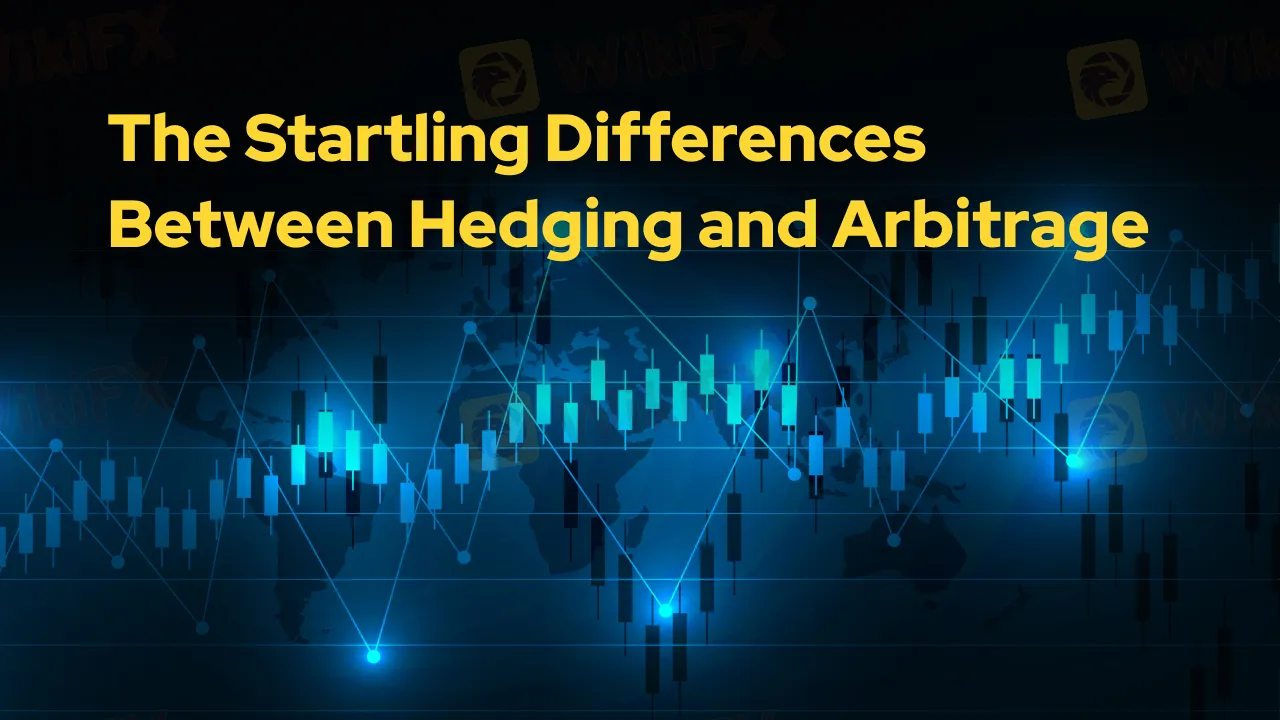简体中文
繁體中文
English
Pусский
日本語
ภาษาไทย
Tiếng Việt
Bahasa Indonesia
Español
हिन्दी
Filippiiniläinen
Français
Deutsch
Português
Türkçe
한국어
العربية
The Startling Differences Between Hedging and Arbitrage
Abstract:The two risk management investment tools - hedging vs arbitrage - have been helping investors achieve their respective financial goals. Explore this comparision to understand their functionalities, the investment purpose they serve, the risk attached, and several other aspects.

The two risk management investment tools - hedging vs arbitrage - have been helping investors achieve their respective financial goals. Arbitrage is a tool by which investors gain risk-free profits by leveraging price differentials across different markets. Hedging, on the other hand, is designed to reduce potential losses by offsetting risks. In this article, we will help you explore the differences between hedging and arbitrage and find out the suitable alternative for you.
Arbitrage Definition
Arbitrage is a calibrated strategy by which investors purchase an asset at a lower price in one market and sell it at a greater price in another market. This largely revolves around leveraging price differences to earn profits.
Example - A currency pair is trading at 1.1000 on one exchange and at 1.1003 on another exchange. So, an arbitrageur will buy the currency pair available at 1.1000 and sell it for 1.1003 to gain a profit of 0.0002.
The strategy works brilliantly amid varying prices across markets. However, as markets become increasingly efficient, the profits tend to diminish.
Hedging Mechanism
Hedging is a proven financial investment strategy that helps reduce the risks associated with price movements in an asset. It helps offset a position by using some derivatives, such as futures or options, to protect against potential loss. For example, exporters expecting payment in Euros can enter into a forward contract to lock in the exchange rate to hedge against currency fluctuations.
The hedging mechanism helps stabilize cash flows and financial results while protecting against unfavorable price movements. On the downside, it reduces potential upside gains for the investors. At the same time, investors need to pay costs such as premiums or meet margin requirements.
Differences Between Hedging and Arbitrage
Still confused which of the two - Hedging vs Arbitrage - is better for you? We get it clear for you through this comparative analysis based on various aspects such as the investment objective, risk, time horizon, etc.
Investment Objective
Arbitrage is designed to maximize profits for investors, while hedging deals with minimizing investment risks for them.
Investment Risk
Arbitrage is a risk-free approach to reaping profits, while hedging helps reduce risks, but it may not be able to eliminate them.
Primary Tools
Arbitrage leverages market inefficiencies to help investors post high profits, while hedging uses derivatives such as futures, options or swaps to mitigate investment risks.
Time Horizon
Arbitrage works well over the short term, whereas hedging works better over the long term.
Market Impact
While arbitrage helps equalize prices across markets, hedging leads to stabilizing financial outcomes.
Summing Up
Hedging and arbitrage help investors with their unique characteristics. While arbitrage ensures efficiency by leveraging price differences, hedging protects against market uncertainties. Traders, based on their investment goals, exercise either of these two options to navigate a seemingly complex financial market.
Frequently Asked Questions (FAQs) on Hedging vs Arbitrage
Can I Use Hedging and Arbitrage Together?
Yes, you can use both of these strategies that serve your different investment purposes.
What are Some Common Hedging Instruments?
These are futures, options, forwards, and swaps
Can Arbitrage Ensure Profits Every Time?
While arbitrage is indeed a tool to earn risk-free profit, it does not guarantee it every time. Factors such as transaction costs, execution risk and market volatility can erode or eliminate profits.
Why Investors Resort to Hedging Amid Market Volatility?
Hedging helps protect investments from adverse price fluctuations and lets investors sail amid a highly volatile market.
We cant wait for you to join our growing community - WikiFX Masterminds. Scan the QR code today to join and discuss forex.

Disclaimer:
The views in this article only represent the author's personal views, and do not constitute investment advice on this platform. This platform does not guarantee the accuracy, completeness and timeliness of the information in the article, and will not be liable for any loss caused by the use of or reliance on the information in the article.
Read more

Plusonetrade Exposed: Promises High Returns, Delivers Only Trade Losses
Do you feel that Plusonetrade only makes you deposit with high-return promises? Does it deny withdrawals or allow you to take away just the principal amount? Have you been witnessing a lack of customer support to address your withdrawal queries at this forex broker? You have unfortunately trusted a fake broker that is operating without a valid license. The scams are obvious as traders are vehemently opposing the foul play committed by Plusonetrade on broker review platforms.

Avoid Losing Money: 6 Red Flags That Make LQH Markets Risky Choice
The only true way to protect your hard-earned money in the forex market is by staying informed and alert. With the growing number of fraudulent brokers, this dynamic and tempting market has become increasingly risky. Awareness is your best defense. This article serves as another important scam alert, to help you stay safe and avoid losing your money.

Most Volatile Currency Pairs You Should Know Before Trading
Do you think that trading in the most volatile currency pairs is a loss-making proposition? Maybe you are missing out on the profit waiting for you! Yes, you still need to be tactical and strategic when opening and closing positions. However, the increased possibility of dramatic price movements in currency pairs opens up avenues for higher profits while also exposing you to market risks. In this article, we will discuss the most volatile forex pairs worldwide. Read on!

Is Learning Forex Trading Online a Good Idea? Pros and Cons Explained
Forex trading is becoming more popular around the world. To help with this, many brokers are offering forex education courses. Some are free, and some are paid. Some brokers even have special academies to teach trading. This trend is growing fast, but the big question is: Is learning forex online really helpful? And what are the risks that you may not know about? I
WikiFX Broker
Latest News
XS.com Broker Partnership Expands Liquidity with Centroid Integration
EC Markets: A Closer Look at Its Licenses
Housewife Scammed of RM68,242 in Online Investment Scam
From Charts to Profits: Unleashing the Power of Forex Trading Tools
FCA Publishes New Warning List! Check It Now to Stay Safe
Beware of Fake RS Finance: How to Spot Scams
Fortune Wave Solution: SEC Warns of Investment Scam
D. Boral Capital agrees to a fine as a settlement with FINRA
Is TD Ameritrade Safe? How to Spot Fake URLs and Stay Protected
Before You Trade with Quest: 6 Warning Signs to Know
Currency Calculator


